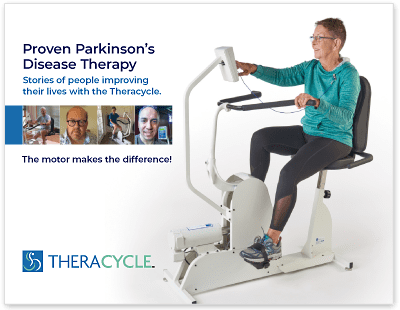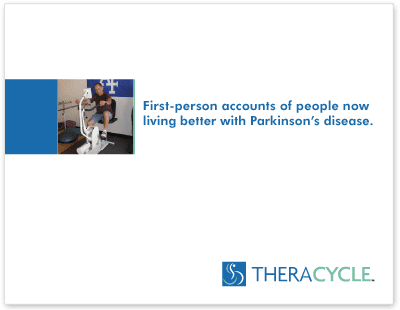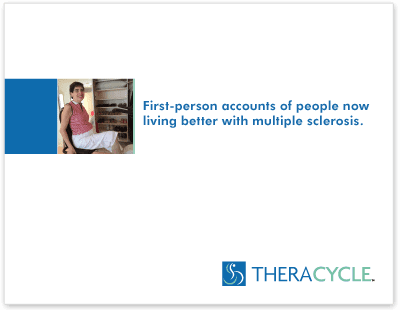- ›
- Stories
- ›
- Your Stories
- ›
- Parkinson’s Disease: Nutritional Strategies and Recommendations
Stories
Parkinson’s Disease: Nutritional Strategies and Recommendations
The Holiday Season is over! With the New Year, it’s time to get back to healthy eating!
Proper nutrition for people with Parkinson’s disease is a recurring theme here at The Theracycle Blog. Thus we’re glad to post a very informative write up on concerns and recommendations for Parkinson’s nutrition, courtesy of the California Parkinson’s Group (www.calparkinsons.org), whose mission is to “foster support and collaboration among friends and families with young onset Parkinson’s Disease through dialogue, education and involvement in the medical research community.”
Be sure to visit the CPG for a collection of useful PD materials and to participate in their forums: www.calparkinsons.org

Your mother always told you to “EAT YOUR PRUNES!” Read on to learn why and other helpful insights in “Significance of Nutrition in Parkinson’s” from our friends at the CPG.
Significance of Nutrition in Parkinson’s
Source: California Parkinson’s Group www.calparkinsons.org
Potential risk(s) of malnutrition are due to the following:
- Gastrointestinal nerves are affected, leading to slow movement of food along the GI tract, constipation, swallowing problems, and loss of sense of taste and smell.
- Medications can have a side effect of nausea and appetite loss
- Levodopa, an important medicine for Parkinson’s must compete with protein for absorption from the small intestine
Common Concerns:
Protein-Levodopa Interactions
There are some barriers when taking quick-release medicine (such as Sinemet). Protein is broken down in the intestine into amino acids. These amino acids must travel across the intestinal wall to get into the blood. Then they must cross the blood-brain barrier to enter the brain. Sinemet also must transit the intestine and the BBB using exactly the same carrier system as the amino acids. If amino acids use all the carriers, the medicine has to wait until the carriers are free again. Therefore, it’s best to take quick release medicine 30-60 minutes before eating a meal. This allows absorption before the food can interfere. If you experience nausea with the medicine, take with ginger tea and a couple of soda crackers. If your nausea is not relieved, please talk with your doctor about anti- nausea medication.
When dealing with controlled-release medicine, it is recommended to have a “balanced- protein plan”. This means learning your protein needs with your registered dietitian, and evenly distributing your protein intake throughout the day. Sometimes people will not eat protein during the day so they can be mobile. This plan is not ideal, however, because mobility is greatly reduced during the nighttime from protein consumption at dinner, and many people find they have difficulty with getting in and out of bed. This, in turn, tempts people to forego their protein intake in the evening to have better control of symptoms for a better night’s sleep. This can lead to protein starvation, then illness, even hospitalization.
Unplanned weight loss
People with PD often lose weight unintentionally for several reasons. Depression can cause lack of desire to eat. Chewing or swallowing problems can hinder intake. Some have difficulty handling a fork and knife. Tremor can burn up many extra calories. Weight loss should not be taken lightly. Muscle wasting can make it more difficult to walk, maintain proper balance, and perform the usual activities of life. Furthermore, the body becomes depleted of vitamins and minerals which can lead to altered mental function, depressed immune system, weakened bones, and other undesirable outcomes. That all being said, it may be a daunting task to face a big plate of food. Instead, aim for three small meals a day and three or more nutritious snacks. If weight loss has already occurred, remember to add enough calories to regain the weight back.
Bone thinning
Unplanned weight loss means losing bone mass as well as muscle and fat. This means higher risk for osteoporosis for both men and women. Adults 50 and older need 1200mg of calcium per day. Although milk and cheese are strong sources of calcium, these foods are not recommended due to the high level of protein. Here are some recommendations:
- Calcium-fortified orange juice
- Calcium-fortified rice or soymilk
- Breakfast cereals with calcium
Additionally, magnesium is a major player for people with PD. It helps rebuild and strengthen bone. It also can assist as a muscle relaxant, and may be beneficial to people who experience rigidity as a primary symptom.
Bowel impaction
If the stool moves very slowly, it can become dry and hard. This leads to constipation. Bowel impaction occurs when dry, hard feces accumulate in the colon and cannot be passed. It is painful, and may require hospitalization. An ounce of prevention is worth a pound of cure. It is important you eat 25-35g fiber daily, along with plentiful fluids. Water works hand in hand with fiber to keep the stool bulky. Laxatives are powerful, but work in a different way. If you are doing the above recommendations and still are having trouble, a remedy used in hospitals is called the “Prune Juice Cocktail”.
Mix together:
- 1/2c applesauce
- 2 T wheat bran (miller’s bran)
- 4-6 oz prune juice
Take a tablespoon each day at first, gradually increasing until you find the amount that works best. You may also want to try a product like Unifiber. This can be mixed with liquids or stirred into thicker foods, like mayonnaise, applesauce, cooked cereals, and other foods. Either the pharmacist can order it or you can call Niche Pharmaceuticals @ 1800.677.0355. Finally, stool softeners may also be an option as an added tool to your bag of tricks. Laxatives stimulate the nerve endings in the colon, causing rapid removal of bowel contents. Over time, laxatives damage the lining of the colon, causing even greater difficulty with constipation. For this reason, laxatives should be used sparingly.
Dehydration
There are many things to think about, so fluids are easily forgotten. When there is not enough water to go around, the body takes water out of the colon and conserves it for other organs. This can cause constipation. Moreover, the medicines can cause dry mouth and dry eyes. Drinking fluids can counteract this. Dehydration can also allow bacteria to grow, leading to such things as urinary tract infections and tooth decay. Signs of dehydration include urinary tract infections, low back pain, mental confusion, dizziness, fatigue, dry tongue, mouth and crack lips, sunken eyes, dark urine, difficulty swallowing liquids or speaking, upper body weakness, and weight loss.
Vitamin interactions
Vitamin B6 no longer thought to be a problem now with the newer medicines. As long as someone is taking a carbidopa or benserazide-levadopa medicine, it is recommended that the vitamin supplement contain no more than 15 mg of B6 daily. Food sources of B6 include chicken, fish, pork, eggs, brown rice, soybeans, oats, whole wheat, peanuts, walnuts and fortified cereals.
Recommended Resources:
Internet:
www.eatright.org
American Dietetic Association
www.nat.uiuc.edu
Nutrition Analysis Tool. Allows the reader to enter a food or list of foods for nutrient analysis.
www.navigator.tufts.edu
A rating guide to nutrition websites (from Tufts University) one of the most respected schools of nutrition in the world.
www.parkinson.org
The National Parkinson Foundation
Books:
“Eat Well, Stay Well with Parkinson’s Disease”, or “Cook Well, Stay Well with Parkinson’s Disease, by Kathrynne Holden, MS, RD
##
Editor’s Note: A PDF version of this document is available online in the downloads section of the website of the California Parkinson’s Group at: http://www.calparkinsons.org/docs/Documents/Files/Parkinsons%20Files/Significance_of_Nutrition.pdf







